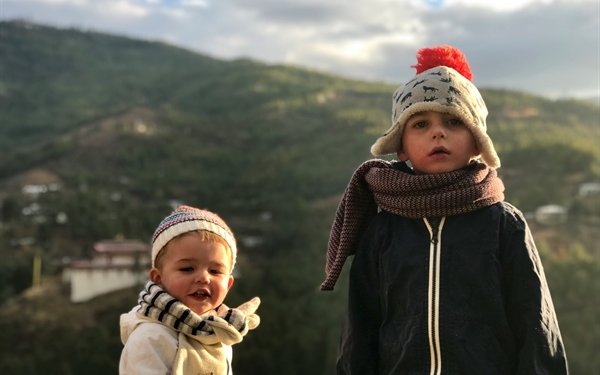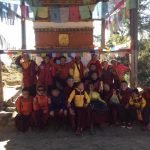Mieke Copper, who is from the Netherlands, speaks about how life was like for her while living in Bhutan.

Ms Mieke Copper, who is originally from the Netherlands, came to Bhutan three times. The third time she came was as a family, with her husband, her son – who was one year and six months old then – and a little one inside her womb. They spent two years in Bhutan working on a project with the Youth Development Fund (YDF), before returning to the Netherlands.
The 33-year-old psychologist first came to Bhutan in 2013 for three months when a Dutch NGO she was volunteering at, Innocis Foundation, started a project with YDF in Bhutan. The project’s aim was to improve the mental healthcare systems provided for the youth in need of help at the Rehabilitation in Serbithang, Thimphu. She did research on current rehabilitation and set up strategic plans on what changes could be made. She trained the counsellors of the Rehabilitation in cognitive behavioural therapy, motivational interviewing and psychopathology. She came back in 2015 for a month to provide booster trainings in Serbithang.
But this wasn’t Ms Copper’s last sojourn to Bhutan. The third time she came was in 2017, along with her husband, her 1.5-year-old son, and a baby inside her womb. This time, her mission was bigger and more concrete: she was required to set up a new treatment model at the new Bhutan Institute of Wellbeing.

She specifically developed an evidence-based treatment programme, combined with Eastern/Buddhist philosophies, as well as train and guide the counsellors in these new principles as an innovative way of counselling. She saw them every other week to discuss struggles, doubts, questions to learn more to develop into more professional counsellors. She spent two years in Bhutan on this, and moved back to the Netherlands at the end of December 2018.
Her first impression about the country
Ms Copper told us that Bhutan was the most welcoming place on earth: “The Bhutanese living so close to their true self, where she could become friends without any boundaries.”
Her life in Bhutan
Life in Bhutan was interesting for them, said Ms Copper. Moving back to the Netherlands has allowed her to re-appreciate her life in Bhutan in unique ways.
“Being part of a Western society again – with rush hour, stress, full social agendas and expectations from oneself and others – makes me value our life in Bhutan even more” said Ms Copper.

During her two years in Bhutan, she worked five days a week, partly at the Institute in Tshaluna and partly from the head office of YDF in Thimphu. She loved to work with counsellors on new insights, improvements and creative ways of doing therapy.
“I enjoyed the drive through the scenic valleys, where village life unfolded right in front of my eyes,” recalled Ms Copper.
She loved the time she could spend with her little boys and being able to be home at five o’clock, have dinner with her family and spend the weekends hiking up the mountains in Bhutan – all these were so precious to her, said Ms Copper.
“I loved being part of a culture where Buddhism is so alive. I feel so close to it, without being able to explain it.
“I loved the spontaneous life in Bhutan. Nothing was planned, nothing was fixed, nothing was expected. That gives a peace of mind that is indescribable. Being able to see what unfolds in the moment is worth everything to me,” she added.
While being in Bhutan, she missed the cafés back home with its dimmed candle lights, biking around in Amsterdam, eating delicious fresh fish, cheese and prosciutto. She said she also missed random encounters with friends, city trips in Europe, and different night outs, that triggered some “investment” (high heels, nice clothes), which she hardly did in Bhutan.
The experience of raising her children in Bhutan
“I feel our life started in Bhutan after the youngest one was born in May 2017 (back home in the Netherlands), and we shifted house in Bhutan in October 2017. From that moment on, we were the happiest persons on earth,” said Ms Copper.
She added that raising her two little boys in Bhutan was one of the biggest gifts for her. According to her, her elder son Cai seems a true old soul, in the sense that he felt so at home in Bhutan, hiking in the mountains and spending time in the monasteries. The youngest one was in love with his nanny. Ms Copper said she got the best nanny in the world, who was the best second mom she could ever wish for her children and that made her feel so grateful.

Cai is crazy about the things he studied about nature at Wangmo Montessori. There, he learned about how vegetables grow and the little animals kept in the garden.

‘Tropenjaren’
Ms Copper told us that there is a Dutch word called ‘Tropenjaren’, which means the tough first years of being a mom and dad that is exhausting and hard to go through. However, she said she never experienced that in Bhutan. She explained that it is because peace, purity and regularity is so present in Bhutan. There was never any need to rush, always had dinner together as a family, she could bring them to bed every day around 7.30pm, and they’d spend the weekends out in the nature.
“Being back home again, I realise how all the parents rush from work to home, quickly having dinner with the kids, and putting them to bed to continue working. And on weekends, they’re rushing from one social activity to another. It seems so far away from peace, purity and regularity,” said Ms Copper.
Challenges she faced in Bhutan
A challenge, which she told us about, was obtaining route permits to visit other parts of Bhutan during weekends. This posed a problem when she had invited friends or family to attend certain festivals. However, Ms Copper added that they understood and “appreciated the way Bhutan tries to preserve the culture and the nature”
When asked if she was happy living in Bhutan, Ms Copper said she felt happy in her own way, because she felt privileged to live this life with her husband and two boys. She felt grateful for all those small adventures they had together.
“I was proud of us as a team, (and of) me and my husband. I felt energised by the work I did. Sometimes I wondered, am I really happy here in Bhutan, is this happiness? I realised it comes and goes. I could be bored as well, craving to have the excitement from back home, eat amazing food, and dance till the sun comes up. But on the other hand, I just absolutely loved the simplicity of life, the intimacy we had created and the joy we found by simply being.
“For me, happiness would be to be in balance, to feel at ease, even if you don’t feel ‘on top of the world’ – a feeling of gratitude can make happy. Overall I would say I felt at home, I could live a part of myself I was never able to live, and I felt so incredibly grateful for that”.
What she loved about the country and how it changed her life?
“I love the Bhutanese, because they are so warm and welcoming. I never experienced this anywhere else in the world. I loved the nature, hiking, fresh air. I loved the blue, clear blue, Himalayan skies. I loved the peace of life we truly felt as if we could live in the first gear, instead of the fifth back home.
“I loved the spontaneous encounters, living without an agenda. I loved our nanny, who was the best gift we could have wished for. I loved my work, being able to develop something from scratch with such an amazing team of counsellors.
“I love all the stories about Bhutan, the cultural richness and the Buddhism that is so alive. I loved lighting our own Bhukari in the cold winters, baking our own bread and make our coffee on the Bhukari.”
Ms Copper said that Bhutan changed her life in a sense where she is more able to live in the present, to keep the agenda empty, and to appreciate the small things.
“It changed me from being the person that always rushed from one appointment to another to taking it easy in life. It made me realise how I love being in a different culture, adding value to themes related to mental healthcare, and how I want to find my inner Bhutan back home in the Netherlands.”

A new thing she learnt while being in Bhutan was to “never rush – it’s not necessary”.
“Appreciate the basics that make you happier, rather than aiming for more and more. Choose to focus on the things that gives you energy, not on what society demands from you. Be in nature as much as you can. Spend time with your kids, the first period in life is worth everything. Keep on broadening your horizon, it’s worth more than anything else. Stay close to your core values.
And never forget about good karma.”
The Content has been adopted from: Daily Bhutan







